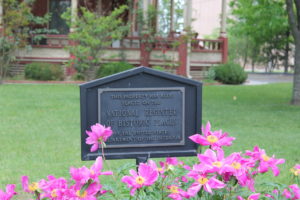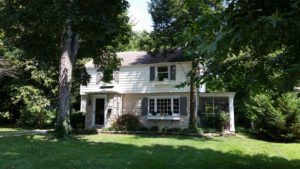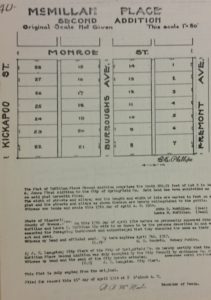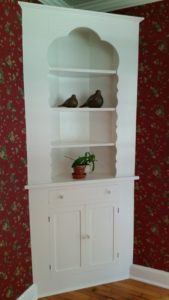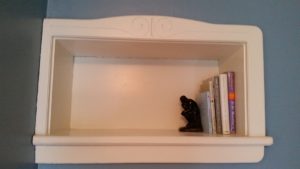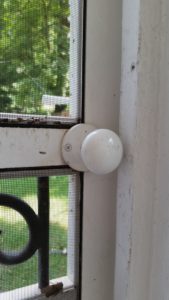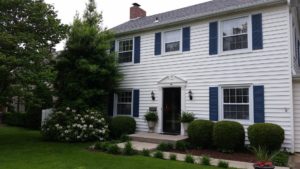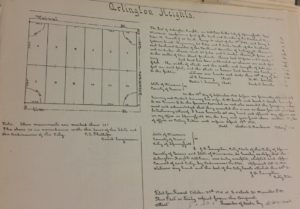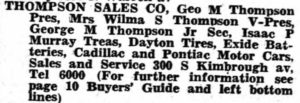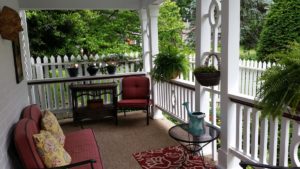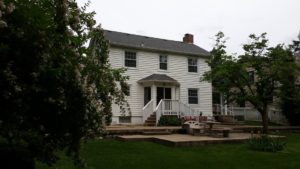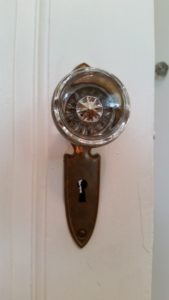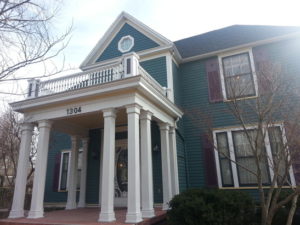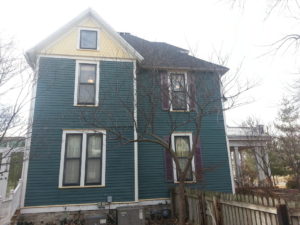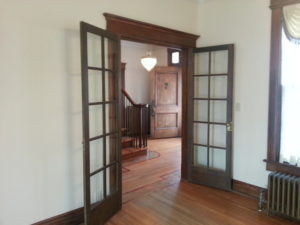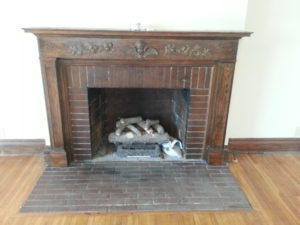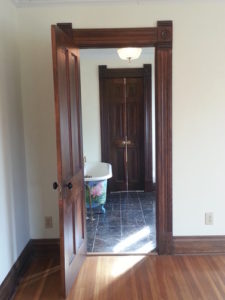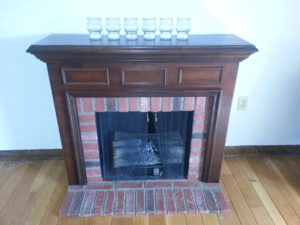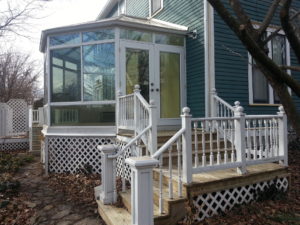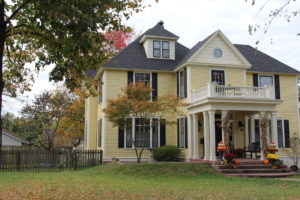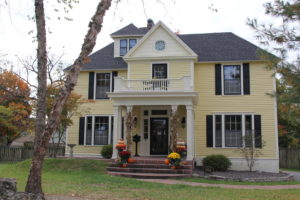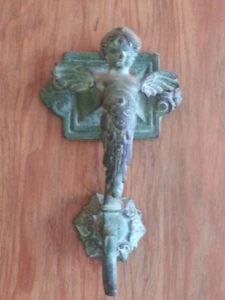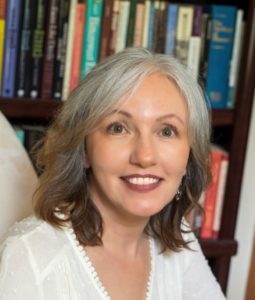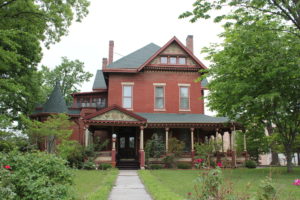
This gem in the heart of Springfield was built in 1881 by J.E. Tolfree. Two years later, Springfield banker and businessman, James E. Keet, purchased the house from Tolfree and transformed what was originally a fairly standard two-story, Italianate brick structure into the extravagant beauty now known as the Keet-McElhany house.
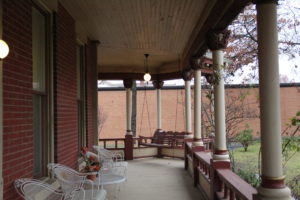
Front porch
James Elijah Keet was born in Washburn, Missouri, in 1849 to Josiah Thomas and Elizabeth West Keet. At that time, Washburn was known as Keetsville and was named after Josiah and his brother, James T. Keet. Josiah later moved his family to Springfield where he became a merchant, first in partnership with William Massey, and subsequently with Newton Rountree. Their business became the well-known Keet-Rountree Dry Goods Company. James E. Keet worked for many years as the secretary and treasurer of the family business and eventually served as its president.
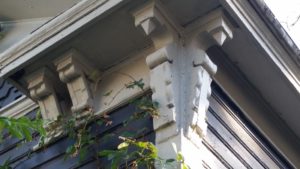
Front porch detail
By 1886, James Keet and his wife, Katherine Holland, had made substantial changes to their new home. The porch was enlarged and became considerably more elaborate. They added the turret on the west wing, as well as an additional building in back that contained a kitchen and servants quarters. They later added a third floor to the house with a Queen Anne-style roof.
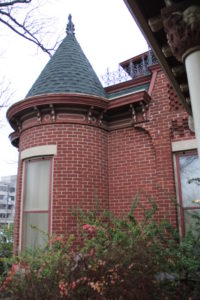
The turret, along with a bedroom and fireplace, were added to the west side of the house in 1886.
Though the primary renovations were done in a couple of different phases, there were ongoing changes to the house that are typical of long term home ownership. Since the Keet family was prominent in Springfield business and social circles, some of those changes were considered newsworthy.

Springfield Leader, November 30, 1887
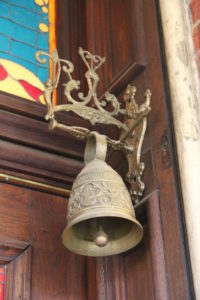
Door bell by the front door. I don’t know if this is electric, but it certainly is a beauty!
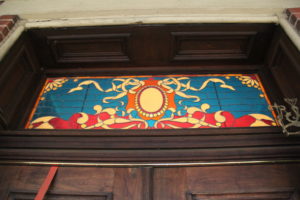
Stained glass above the front door.

Springfield Leader, June 1, 1886
And indeed he did have a “substantial” cellar, one that included a tunnel! The tunnel extends from the basement of the house to the servants quarters in back. Its arched roof is visible above ground.
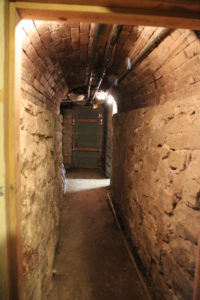
What a beautiful brick archway!
Now let’s take a look inside the house.
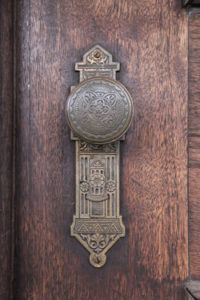
Front door knob with intricate design.
The house contains over 6,000 square feet, including the basement and tunnel area. It contains 5 bedrooms, 5 baths, and numerous fireplaces. Though it is over 100 years old, the house has been excellently maintained and even retains many of the original features.
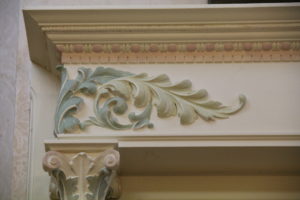
Detail on the beautiful front parlor fireplace.
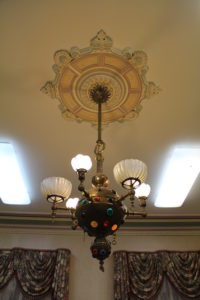
An original gas lamp, converted to electric.
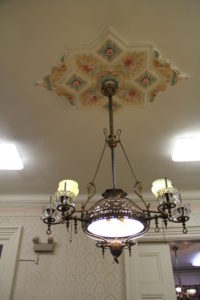
Another original lamp in what was once the dining room.
It may have been in this dining room that the Keet’s held their Thanksgiving dinner in 1899. The Springfield Republican reported that “Mr. and Mrs. James E. Keet’s guests at Thanksgiving Dinner were; Mr. and Mrs. J.L. Holland, Mr. and Mrs. Lee Holland, Mr. and Mrs. Ralph Holland, Mrs. E.J. Robberson, Mrs.Arthur Taylor, Miss Lida Robberson, Miss Emily Otterson and Mr. Jamie Holland.” The Holland family were prominent in Springfield business and banking and were relatives of Katherine Keet.
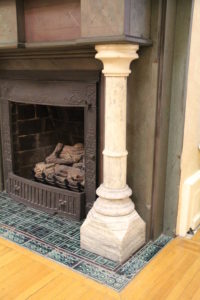
One of many beautiful fireplaces in the house.
The activities of the Keet family were consistently reported in local newspapers. In June 1888, an “elegant reception” was held in the home of Mrs. L.A. Campbell “at the home of her father, Major McElhany.” Mrs. James Keet wore “blue and white French gingham, puffed sleeves and front fichu style, garnished with picot edged ribbon.” Major Robert J. McElhany was a Springfield banker; his grandson, Claude, would later marry Katherine E. Keet, one of the daughters of James and Katherine.
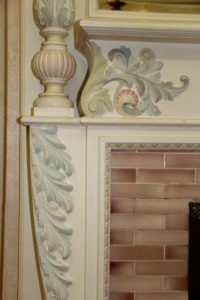
Another beautifully detailed fireplace.
Three prominent Springfield families, the Keets, Hollands, and McElhanys, all three bankers and merchants, intersected in this one house. Though this beautiful home is now surrounded by businesses and parking lots, she was once surrounded by numerous beautiful homes. Those homes are no longer extant. Somehow, this house alone survived the expansion of the central business district.
James E. Keet died in July 1900. The St. Louis Republican took note of his passing: “James E. Keet, one of Springfield’s most prominent businessmen, died today. He was president of the National Exchange Bank, president of the Keet-Rountree Wholesale Dry Goods Company, and a moving spirit in a number of other [illegible] concerns.”
In his 1895 will, James stated that he had complete “faith and confidence in [his] wife, Kate,” and believed that she would ensure the welfare of their children; therefore, he left the entire estate to her. In a codicil, written barely a month before his death, he bequeathed one thousand dollars to each of his siblings.
Katherine Holland Keet lived in the house until her death in 1920. James and Katherine’s daughter, Katherine E., was already living there with her husband, Claude McElhany. Claude died in 1956 and Katherine E. remained in the family home until her death in 1983.
